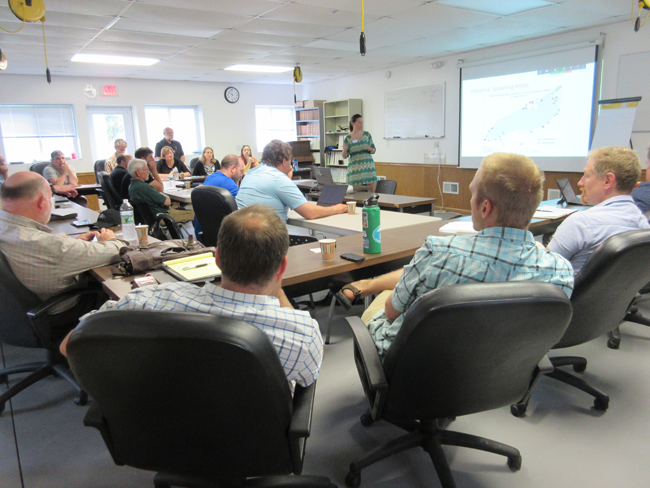NYSG programming is facilitating critical Cisco research and monitoring synergies to ultimately add diversity to fisheries-based economies
Contact:
Jesse Lepak, NYSG Fisheries & Ecosystem Health Specialist, P: 315-312-3042, E: Jesse.Lepak@cornell.edu
Oswego, NY, March 4, 2019 - Cisco (Coregonus artedi) once supported important commercial fisheries in New York State and represented a primary prey fish in Lake Ontario. Today, however, their stocks are dramatically depleted and there is need to better understand and potentially restore their populations.
Communities around Lake Ontario rely heavily on the lake’s fisheries resources for their economic, recreational, and cultural value. For example, anglers attracted to Lake Ontario and its tributaries have contributed more than $114 million dollars to the New York economy (Connelly and Brown, 2009). Native Cisco (if more abundant) have the potential to provide a fishery and a more diverse, resilient, and sustainable forage base for predators such as King Salmon that draw anglers to Lake Ontario from around the world.
Multiple ongoing efforts are focused on Cisco, however, it became apparent that increased communication between research, management, and conservation groups could be beneficial to all. On May 31, 2018, New York Sea Grant (NYSG) co-organized a workshop to exchange ideas, provide updates, and contribute to breakout groups focused on Cisco in Lake Ontario.
More than 30 experts — representing Cornell University, the New York State Department of Environmental Conservation, the Ontario Ministry of Natural Resources and Fisheries, Queen’s University, SUNY Brockport, University of Buffalo, U. S. Fish & Wildlife Service, and U.S. Geological Survey — met at the Cornell University Biological Field Station in Bridgeport, NY, as part of a Cisco workshop project funded in part by NYSG and The Nature Conservancy.
Participant-ranked research priorities and considerations for future work and collaboration were identified and included in a workshop summary completed by the organizers for use by all participants in 2019.
NYSG is participating in addressing the need to connect disparate groups focused on Cisco research, monitoring, conservation, and management. The 2018 workshop generated synergy among key stakeholders and should facilitate improved understanding and management of Cisco into the future.

Cornell University Ph.D. candidate Ellen George shares a Cisco research update at the May 2018 Cisco workshop. Credit: NYSG/Jesse Lepak.
Partners:
• Cornell University
• NYS Department of Environmental Conservation
• Ontario Ministry of Natural Resources and Fisheries
• Queen’s University
• State University of New York Brockport
• University of Buffalo
• U. S. Fish & Wildlife Service
• U. S. Geological Survey
Funding:
• New York Sea Grant
• The Nature Conservancy
More Info: New York Sea Grant
New York Sea Grant (NYSG), a cooperative program of Cornell University
and the State University of New York (SUNY), is one of 33 university-based
programs under the National Oceanic and Atmospheric Administration’s
National Sea Grant College Program.
Since 1971, NYSG has represented a statewide network of integrated
research, education and extension services promoting coastal community
economic vitality, environmental sustainability and citizen awareness
and understanding about the State’s marine and Great Lakes resources.
Through NYSG’s efforts, the combined talents of university scientists
and extension specialists help develop and transfer science-based
information to many coastal user groups—businesses and industries,
federal, state and local government decision-makers and agency managers,
educators, the media and the interested public.
The program maintains Great Lakes offices at Cornell University, SUNY
Buffalo, SUNY Oswego and the Wayne County Cooperative Extension office
in Newark. In the State's marine waters, NYSG has offices at Stony Brook
University in Long Island, Brooklyn College and Cornell Cooperative
Extension in NYC and Kingston in the Hudson Valley.
For updates on Sea Grant activities: www.nyseagrant.org has RSS, Facebook, Twitter, and YouTube links. NYSG offers a free e-list sign up via www.nyseagrant.org/nycoastlines for its flagship publication, NY Coastlines/Currents, which is published quarterly. Our program also produces an occasional e-newsletter,"NOAA Sea Grant's Social Media Review," via its blog, www.nyseagrant.org/blog.